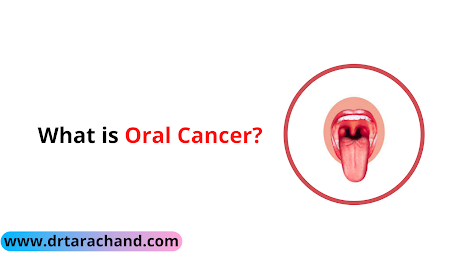In general, doctors and scientists define cancer as the growth of cells invading and causing damage to surrounding tissues. This growth of cells is uncontrollable. Oral cancer specialist in Jaipur defines it as the growth or sore in the mouth, which does not go away. There are many types of oral cancers that patients may have, like oral cancer of lips, tongue, cheeks, the floor of the mouth, soft or hard palate, sinuses, and throat.
Let us discuss oral cancer in depth so that you can understand its symptoms, who might have, and treatment of oral cancer.
Symptoms Of Oral Cancer:
- There might be swelling, thickening, lumps or bumps, crust, rough spots, eroded areas on lips, gums, or another location of the mouth.
- Unexplainable bleeding inside the mouth.
- There might be velvety white, red, or speckled patches inside the mouth.
- There might be a feeling of something caught or soreness at the back of the throat.
- If you can see an unpredictable or dramatic loss of weight, then it is a symptom of it.
- There might be a pain in the ear of change in the way your teeth meet.
- You might feel it difficult while chewing, swallowing, moving the jaw, speaking, or moving your tongue.
Who Might Be The Patient?
- Men are at risk of oral cancer twice women. After the age of 50, men are at more risks. Here are the risks-factors of oral cancer so that you can understand who might have this cancer.
- Smokers or cigar, cigarette, or pipe are at risk of oral cancer six times than non-smoking men.
- Users of tobacco, dip users, snuff, or men chewing tobacco are at risk 50 times more than others.
- Consumption of alcohol in excessive amounts increases the chances of oral cancer six times.
- If you have a history of cancer in the family, then it increases the chances of oral cancer.
- Viruses like human papillomavirus (HPV) can increase the chances of oral cancer.
What Happens After Oral Cancer?
Approximately 25% of cases of oral cancer occurred in people who do not smoke or drink alcohol, and pharynx cancer is 84 %. If it has spread to tissues, organs, lymph nodes, or other parts, then the survival rate drops to 65 % from five years.
How To Diagnose Oral Cancer?
Dentists perform an oral cancer screening, or if your dentist feels any irregular lumps or tissue in your neck, head, face, or oral cavity, then he tests. While examining the mouth, the dentist looks for soreness or discolored tissues, and he also checks for any symptoms that we have discussed above.
It may require a biopsy so that dentist can determine any suspicious areas. Various types of biopsies are available, but your doctor will suggest the most suitable one. Most doctors use a scalpel biopsy instead of brush biopsy, or they use a scalpel biopsy to confirm the results got from a brush biopsy.
How To Treat Oral Cancer Patients?
The Oral cancer specialist in Jaipur says that the treatment for this cancer is the same as it is for other cancers. It is a surgery used to remove the growth, radiation therapy after surgery, or Chemotherapy to kill remaining cells.
Prevention Of Oral Cancer:
Have you ever thought about how to prevent the development of oral cancer? The following tips are helpful to prevent oral cancer.
- Stop using tobacco, smoking, and alcohol.
- Do not expose to the sun limitless, and be protective of your skin.
Wrapping Up:
Did you understand the types, symptoms, targeted people, diagnosis, treatment, and prevention of oral cancer? If you think you have any of the symptoms of throat cancer that we have discussed above, then contact an oral cancer specialist in Jaipur for the treatment and therapies. Being aware of health and your body can help you prevent oral cancer.
Read More Articles:-
- https://list.ly/list/59W3-dr-tara-chand-gupta-lung-cancer-specialist-in-jaipur
- https://medium.com/@tarachandseo/how-does-breast-cancer-start-859ca5393cd1
- https://medium.com/@jaipur.care12/immunotherapy-3dd8e40d4d16?sk=57c910fd558038a79fafb4729cad287a
- https://www.evernote.com/shard/s441/client/snv?noteGuid=b4aa1079-e066-769a-d386-a7d7b24ce616¬eKey=055ed1865f6d5e369827947a916291fa&sn=https%3A%2F%2Fwww.evernote.com%2Fshard%2Fs441%2Fsh%2Fb4aa1079-e066-769a-d386-a7d7b24ce616%2F055ed1865f6d5e369827947a916291fa&title=What%2Bis%2BImmunotherapy-%2BDr%2BTara%2BChand%2BGupta
- https://justpaste.it/7667l
- https://www.reddit.com/user/drtara-oncologist-/comments/qd9tcd/what_is_immunotherapy_dr_tara_chand_gupta/
- https://telegra.ph/What-is-Immunotherapy--Dr-Tara-Chand-Gupta-10-22
- https://medium.com/@tarachandseo/how-does-breast-cancer-start-859ca5393cd1?sk=3753e9af41ffb8ea9042028b198c39bd
- https://www.evernote.com/shard/s441/sh/66f49868-8181-1a20-7407-500ce19886b4/6d5bd95d1add881c205736c4cdc9d0fc
- https://www.articleted.com/articles.php
- https://justpaste.it/9ny2a
- https://www.reddit.com/user/drtara-oncologist-/comments/qg00ei/how_does_breast_cancer_start_dr_tara_chand_gupta/?utm_source=share&utm_medium=web2x&context=3
- https://telegra.ph/How-Does-Breast-Cancer-Start--Dr-Tara-Chand-gupta-10-26
- https://medium.com/@tarachandseo/what-are-the-4-stages-of-breast-cancer-cb61791955ca


No comments:
Post a Comment